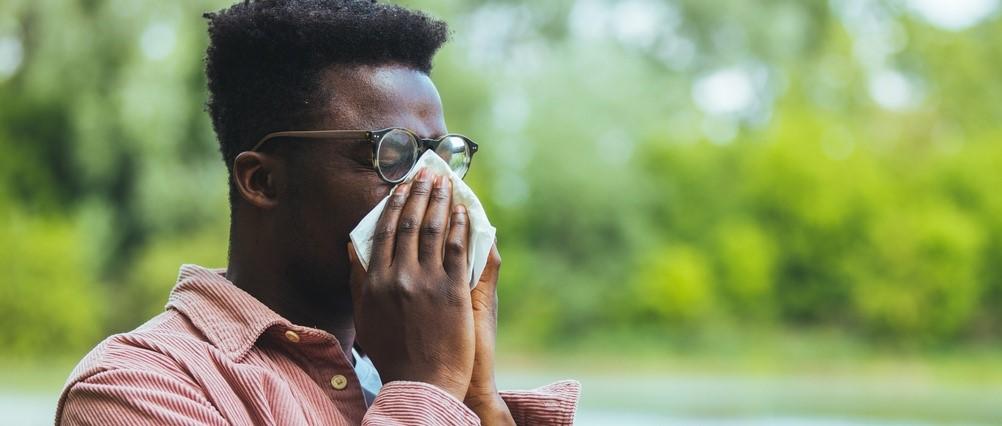
Hay fever: how your pharmacist can help
Peer reviewed by Dr Sarah Jarvis MBE, FRCGPLast updated by Gillian HarveyLast updated 20 Apr 2021
Meets Patient’s editorial guidelines
- DownloadDownload
- Share
- Language
- Discussion
With hay fever season approaching, many sufferers will be stocking up on hay fever remedies. But to prevent or treat hay fever effectively, it may be worth getting additional medical advice. The best place to start is at the pharmacy, where qualified staff will be able to help you in a number of ways.
In this article:
Continue reading below
Professional diagnosis
Most of us know the main symptoms of hay fever which include a runny, blocked or itchy nose, sneezing, itchy/watery red eyes and an itchy throat. So if we start to develop these symptoms, it makes sense to go and pick up some hay fever medication. However, before self-diagnosing, it's important to know that these symptoms could also indicate other conditions. To make sure, it's worth having a chat with your pharmacist first.
"We need to ascertain what the symptoms are, when they started, and any associated symptoms as well as find out what patients have tried so far and whether it was effective," explains Anshu Kaura, Pharmacist from LloydsPharmacy. "For example, there are a several similarities between COVID-19 and hay fever. We also need to find out about other conditions patients may suffer from and whether they're on any other medication."
Recommended treatment
Back to contentsWhen it comes to hay fever treatment, there are a range of different remedies. "If you have nasal symptoms and are over 18, we might recommend a nasal steroid," explains Kaura. "These work by reducing inflammation in the nasal passage and can also bring down inflammation in the eye area." For patients who suffer from itchy, watery or red eyes, the pharmacist may also recommend eye drops (mast cell stabilisers) to reduce symptoms.
Finally, a third potential treatment is with oral antihistamines, which help to eliminate allergic reaction to pollen and other allergy triggers.
With so many different treatments on offer, having a professional to recommend the best course of action in your specific circumstances can be invaluable.
"When prescribing, we'll ask questions about when your symptoms are problematic and might ask whether you drive, or you operate machinery," explains Kaura. "For example, some oral antihistamines have a sedative effect, which is not something you want if you're driving, operating machinery, or even taking exams. We can advise on the best course of treatment."
Continue reading below
Medical history
Back to contentsWhile all medications will have a leaflet detailing side-effects and advising about pre-existing conditions, your pharmacist can give you advice relating specifically to your circumstances and may be able to suggest alternatives if a certain treatment is not advisable.
"For example, if you're pregnant, non-oral medications might be recommended, but on a case-by-case basis," explains Kaura. "Other medications may not be suitable if you have reduced renal function or other underlying conditions."
Making sure the course of treatment is safe in your particular circumstances is essential.
Self-care advice
Back to contentsAs well as recommending the right medication, your pharmacist can advise you on self-care that will help reduce hay fever symptoms naturally. "You can now buy an 'allergy reliever' - a device that releases light therapy into the nasal passage, designed to reduce allergy symptoms," says Kaura.
"We'd also advise self-care, such as putting Vaseline around your nostrils to stop allergens entering into your system, or cleaning your nasal passage with saline solution.
"Vacuuming regularly at home, looking at the pollen forecast and closing the window can also help. There are a lot of lifestyle changes that can make a real difference."
Continue reading below
Referral to a doctor
Back to contentsFor many the right product at the right time can significantly reduce or eliminate hay fever symptoms. The vast majority of medications available on prescription from the GP can be provided by the pharmacist too. But some may suffer from more stubborn symptoms or have additional conditions that make a referral necessary.
"If your symptoms don't respond, our first port of call would be to try different medications to see if symptoms can be relieved," says Kaura. "But if there are complications, such as a respiratory condition that might be exacerbated by hay fever, or a patient is suffering from acute sinusitis or other associated symptoms, we will refer.
"We might also refer if the pattern of symptoms is very erratic. GPs may even have to refer patients on to a specialist - some people with stubborn allergy symptoms may need to be treated with immunotherapy targeted at their specific allergy triggers, although this is rare."
Availability and specialist care
Back to contentsEven if you've been treating your hay fever with a certain product for some time, it's worth asking your pharmacist about new products, as they will have up-to-date information about over-the-counter solutions. "For example, one of the products that used to be only on prescription - Fexofenadine, 120 mg - is now licensed for hay fever and allergic rhinitis and available to buy over the counter," says Kaura.
The great thing about pharmacists is their availability, says Kaura. "Pharmacies are appointment-free, open all day, usually have a private consultation room and have up-to-date guidelines. They really are the best place to go for specialist advice on minor ailments."
During the pandemic, make sure to follow any guidelines in place at the pharmacy, including social distancing and wearing a face mask unless exempt.
Patient picks for Hay fever

Allergies, blood and immune system
Can babies get hay fever?
Allergies can cause frustration and distress, particularly for babies, who struggle to understand why they feel unwell. While babies can develop hay fever, it is possible to reduce their risks with simple changes to your home and lifestyle.
by Emily Jane Bashforth

Allergies, blood and immune system
Hay fever: How to cope with a 'pollen bomb'
With the warmer weather, the tempting smell of barbecues is floating through our windows - but that’s not the only thing in the air. Levels of pollen are always higher in the warmer months - and when we have periods of hot and dry days we may get what is called a pollen bomb.
by Lydia Smith
Continue reading below
Article history
The information on this page is peer reviewed by qualified clinicians.
20 Apr 2021 | Latest version
20 Apr 2021 | Originally published

Ask, share, connect.
Browse discussions, ask questions, and share experiences across hundreds of health topics.

Feeling unwell?
Assess your symptoms online for free
Sign up to the Patient newsletter
Your weekly dose of clear, trustworthy health advice - written to help you feel informed, confident and in control.
By subscribing you accept our Privacy Policy. You can unsubscribe at any time. We never sell your data.